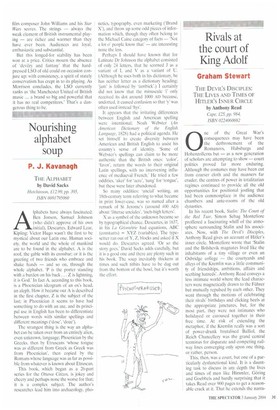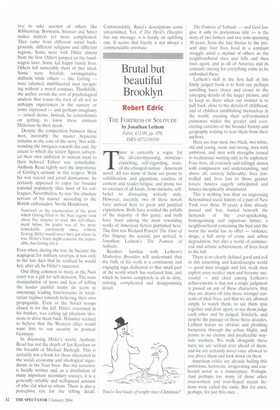Rivals at the court of King Adolf
Graham Stewart
THE DEVIL'S DISCIPLES: THE LIVES AND TIMES OF HITLER'S INNER CIRCLE by Anthony Read Cape, 125, pp. 984, ISBN 0224060082 0 ne of the Great War's consequences may have been the dethronement of the Romanovs, Habsburgs and Hohenzollerns but — as a new generation of scholars are attempting to show — court politics proved far more enduring. Although the costumes may have been cut from coarser cloth and the manners far cruder, the centres of power in totalitarian regimes continued to provide all the old opportunities for positional jostling that had been commonplace in the audience chambers and ante-rooms of the old dynasties.
In his recent book, Stalin: The Court of the Red Tsar, Simon Sebag Montefiore proffered a fascinating whiff of the atmosphere surrounding Stalin and his associates. Now, with The Devil's Disciples, Anthony Read gives an account of Hitler's inner circle. Montefiore wrote that `Stalin and the Bolshevik magnates lived like the inhabitants of a tiny village or even an Oxbridge college — the courtyards and alleys of the Kremlin was a little community of friendships, ambitions, affairs and seething hatreds'. Anthony Read conveys a less intimate world where the lead characters were magnetically drawn to the Fuhrer but mutually repulsed by each other. They went through the motions of celebrating their rivals' birthdays and clicking heels at the appropriate junctures. but, for the most part. they were not intimates who holidayed or caroused together in their free time. At risk of extending the metaphor, if the Kremlin really was a sort of power-drunk brutalised Balliol, the Reich Chancellery was the grand central terminus for disparate and competing railway lines converging only upon one thing, or rather, person.
This, then, was a court, but one of a particularly dysfunctional kind. It is a daunting task to discuss in any depth the lives and times of men like Himmler, Goring and Goebbels and hardly surprising that it takes Read over 900 pages to get a reasonable crack at it. That he extends the narra tive to take account of others like Ribbentrop, Bormann, Strasser and Speer makes matters yet more complicated. They came from different social backgrounds, different religions and different regions. Some were with Hitler almost from the first. Others jumped on the bandwagon later. Some led happy family lives. Others fell noticeably short of that ideal. Some were boorish, unimaginative dullards while others — like Goring were talented, multifaceted men navigating without a moral compass. Thankfully, the author avoids the sort of psychological analysis that traces the root of all evil to unhappy experiences in the nursery or some repressed — and perhaps imaginary — sexual desire. Instead, he concentrates on getting to know these eminent Hitlerians by their deeds.
Despite the competition between these men, inevitably the master hypnotist remains at the core of the story. Not withstanding the intrigues towards the end, the extent to which the senior figures subverted their own ambition to remain loyal to their beloved Fuhrer was remarkable. Anthony Read rightly sees the importance of Goring's attitude in this respect. With his war record and jovial demeanour, he certainly appeared to enjoy far broader national popularity than most of his colleagues. Nevertheless, he was the absolute servant of his master' according to the British ambassador, Nevile Henderson.
Inasmuch as the enumeration of the posts which Goring filled in the Nazi regime took about five minutes to read, this self-effacement before his leader was all the more remarkable, particularly since, without Goring, Hitler would never have got where he was. Hitler's brain might conceive the impossible, but Goring did it.
Even when, during the war, he became the scapegoat for military reverses, it was only in the last days that he realised he would not, after all, be Hitler's successor.
One thing common to many in the Nazi court was a gift for self-delusion. The state manipulation of news and fear of telling the leader painful truths do seem to encourage leading functionaries in totalitarian regimes towards believing their own propaganda. Even as the Soviet troops closed in for the kill, Hitler, cocooned in his bunker, was calling up phantom divisions to drive them back. Himmler seemed to believe that the Western allies would want him to run security in postwar Germany.
In discussing Hitler's world, Anthony Read has not the depth of Ian Kershaw or the breadth of Michael Burleigh. This is certainly not a book for those interested in the social, economic and ideological ingredients in the Nazi brew. But the narrative is lucidly written and, as a distillation of many important secondary sources, it is a generally reliable and well-paced account of who did what to whom. There is also a perceptive eye for the telling detail. Commendably, Reed's descriptions come unvarnished. Yet, if The Devil's Disciples has any message, it is hardly an uplifting one. It seems that loyalty is not always a commendable attribute.



























































 Previous page
Previous page